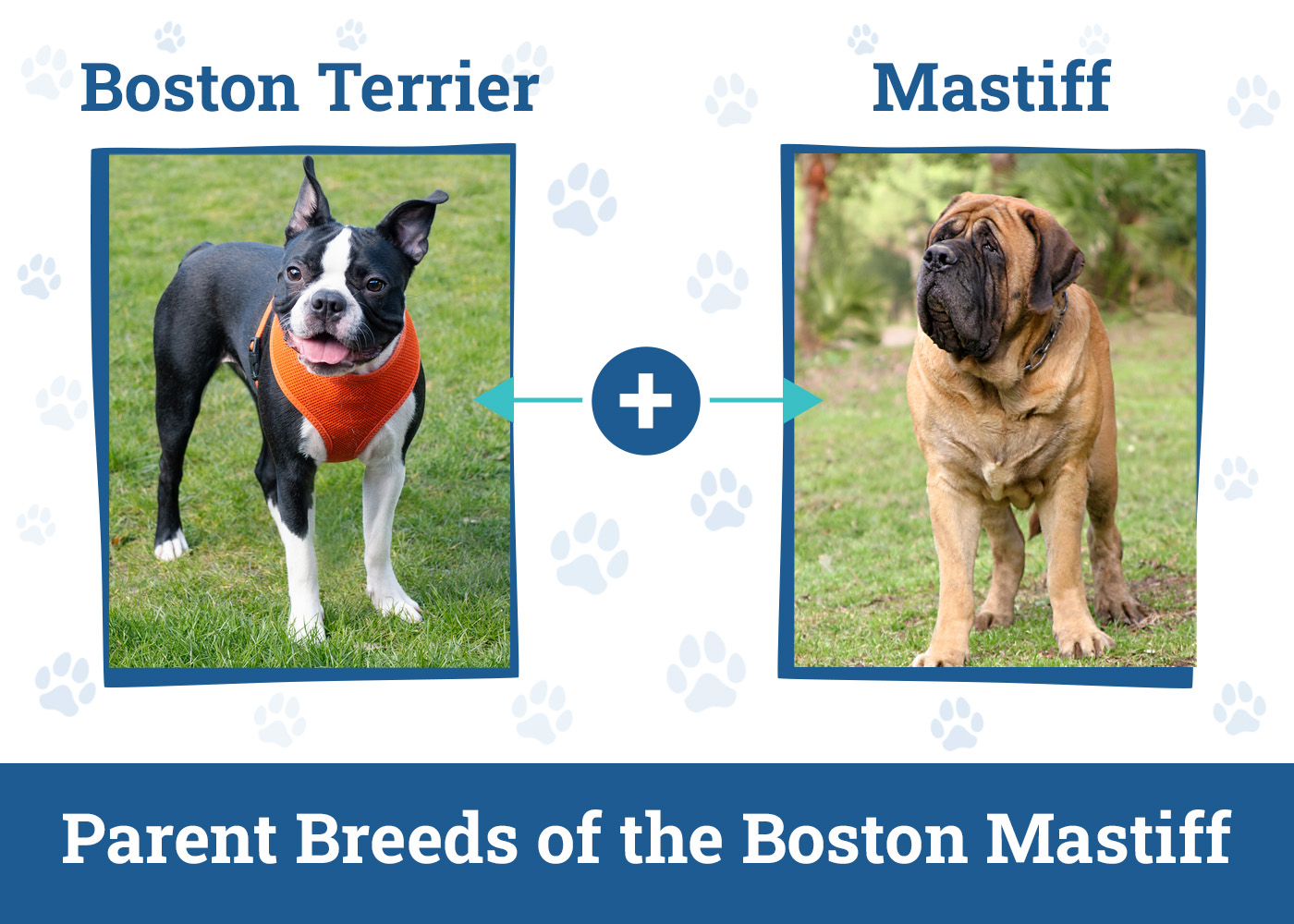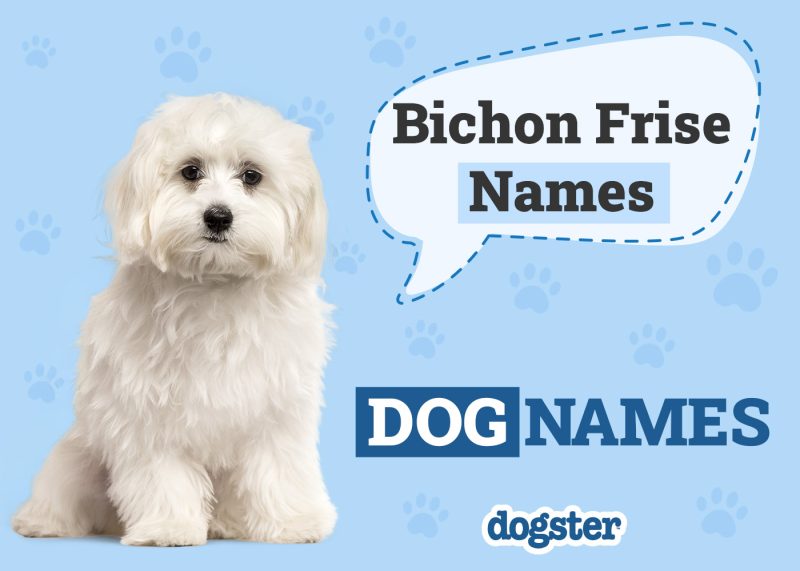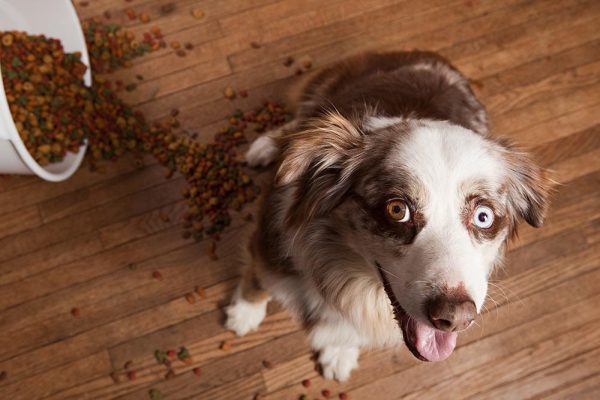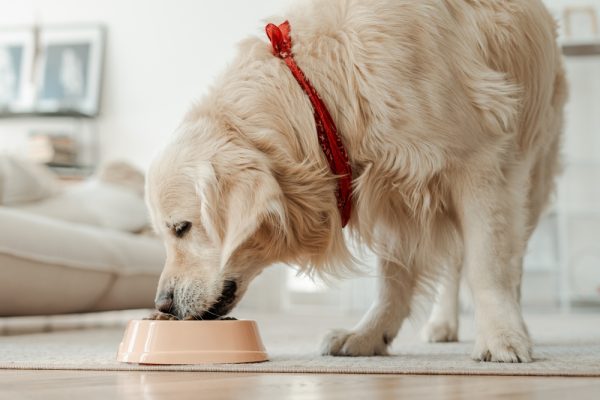In this article
View 8 More +The Boston Mastiff is a mix between the English Mastiff and the Boston Terrier, and they are friendly, loyal, courageous, and intelligent. Since their crossbreeding is the main reason that people take an interest in this mix, it can be quite difficult to predict the temperament and physical traits of a Boston Mastiff puppy. However, these dogs are generally easy to train and make good watchdogs due to their overly protective personality.
In this article, we discuss the Boston Mastiff’s temperament, intelligence, care requirements, and whether they make good family pets. Read on to learn more!
Breed Overview
Height:
20–25 inches
Weight:
80–150 pounds
Lifespan:
8–12 years
Colors:
Fawn, black, white, black and white, apricot, brindle
Suitable for:
Experienced owners and families with an active lifestyle
Temperament:
Playful, protective, alert, courageous, intelligent, friendly, affectionate
When the laidback English Mastiff, one of the largest dogs in the world, is crossed with the much smaller, fun-loving Boston Terrier, the resulting mix is a medium-sized, affectionate breed that can fill a home with excitement and laughter.
The Boston Mastiff is highly energetic and always up for adventure and exploring. They may be better suited for a compound with a yard, but they also make wonderful urban companions, ready to accompany you for your daily errands to the grocery shop or even a hike. Being so social, they simply don’t do well when left to their own devices for long. As an intelligent breed, they learn basic commands fast and thus are easy to train.
Boston Mastiff Characteristics

Boston Mastiff Breed Puppies
If you want to buy a dog from a breeder, do your research. Ask questions to ensure that they are reputable. Besides asking the breeder about the parent breeds, you should also ask to meet the mother dog in person. This will give you a unique opportunity to gauge her temperament and the behavior she models for her young ones.
While it may be the breeder’s responsibility to socialize the puppies while still under his care, it is your sole duty to socialize and train them as soon as they get home.

Temperament & Intelligence of the Boston Mastiff 🧠
The intelligence of a Boston Mastiff seems to be average in the dog intelligence rankings. This is perhaps why this breed is relatively easier to train. They can understand and remember new commands and instructions after about 25–40 repetitions. Sometimes it can be challenging to train them, but with patience and consistency, the effort will be worth it.
Many people opt to keep the Boston Mastiff as a watchdog. They are alert and observant of their surroundings, and once they detect a potential threat, they are not shy about vocalizing their opinions. Their good sense of hearing, coupled with their strong vocal cords and territorial nature, makes them great at protecting property.
Even though most people believe this dog can attack potential intruders, they are also okay with simply alerting the owners of any danger lurking outside their property without necessarily attacking.
Are These Dogs Good for Families? 🏡
Boston Mastiffs are truly soft, loyal, loving, gentle, and affectionate dogs toward their owners. They enjoy spending time with their families and are even considered therapy dogs in some circles. This breed is also great at responding to their owner’s emotions, especially if they have created a tight bond over the years. When you are happy, your Boston Mastiff will be happy too.
They are also apartment friendly. It might be helpful and easier to have a small yard for the dog to handle their nature calls, but it is not a major consideration for this breed. With enough exercise, your dog will be happy to lounge around in your house until you come back at the end of the day.
If you do happen to keep this breed in a house with a yard, you should be careful because they’re considered to have a wanderlust potential. They might sneak out regularly to explore the grounds.
Overall, the Boston Mastiff can make a good family companion, even for families with young kids. However, it would be best to supervise playtime in case of accidents when the dog is excited.
Does This Breed Get Along With Other Pets? 🐶 😽
Boston Mastiffs are some of the friendliest dogs you can own. As a social breed, they enjoy being surrounded by pets, including other dogs. This can be attributed to the fact that they feature a low to medium impulse to chase after smaller animals.
So, if you want to bring a new dog into a home with other pets or join dog meet-up groups, the Boston Mastiff would be your best bet. But make sure the dog is socialized from an early age so the animals can get used to living comfortably under the same roof.

Things to Know When Owning a Boston Mastiff
Food & Diet Requirements 🦴
When it comes to Boston Mastiffs’ food and diet requirements, there are three factors that you have to keep in mind: size, age, and lifestyle.
In terms of age, puppies will thrive with high-calorie puppy food brands to help in their development. Older dogs will require high-fiber protein-filled senior dry dog food brands.
This breed is susceptible to indeterminate weight gain and obesity. So, in terms of food quantity, reach out to your vet about how much food your Boston Mastiff should get. Since this is a mixed breed, their overall size will vary, affecting how much food they need daily.
Also, the diet should be coupled with an active lifestyle, such as daily walks to prevent weight gain. If you notice significant weight gain in your dog, consult your local vet to make a suitable diet plan.
Exercise 🐕
Boston Mastiffs are considered to have an average to high energy level and are best suited for owners with an active lifestyle. Therefore, ensure that your pups receive plenty of exercise. This breed will typically be satisfied with short walks every day, preferably for about 30 minutes. But you can take them for longer walks during the weekend or when you have free time off your busy schedule.
Training 🦮
Just like the Boston Terrier parent, the Boston Mastiff makes an excellent companion dog because of their sociability and friendliness, which also makes their training easier. However, they can still be obstinate, requiring a firm hand during the training sessions.
To end up with a controlled and well-behaved dog, you must train your Boston Mastiff to be safe around other people and animals. They are considered to have an average likelihood of biting someone. The main reasons that this dog might choose to attack include excitement, pain, protection, provocation, or even their herding instinct. So, they need to be trained to have a positive attitude from the word go.
The best way to train a Boston Mastiff is to use positive reinforcement during the sessions. This not only helps the dog learn commands faster but also helps prevent trust issues later in life. Either way, avoid giving them too many treats, as that may lead to obesity in the future.
Grooming✂️
The Boston Mastiff is relatively easy to groom, which is fortunate if you don’t have the resources, skill, and money to keep up with high-maintenance grooming. In fact, using a professional groomer to keep your dog’s coat clean may not be necessary with the Boston Mastiff.
Since they are moderate shedders, they will only need brushing at least once a week to reduce the amount of fur shed, a task you can undertake by yourself. But this will depend on the dog’s general health status. The bathing frequency can be 4 to 6 weeks. Studies have shown that 56% of pet owners do not wash their dogs as required, while 50% only use the sniff test to decide the appropriate time for bathing their dogs.
However, bathing your dog offers myriad benefits. Not only will it give you the chance to get rid of dander and debris from your dog’s coat, but it will also give you a chance to check for fleas, bumps, unusual scratches, and any other irregularities on your pup. All the details in your dog’s body are more visible when the coat is wet and sticking to their body.
Also, your dog’s eyes and ears should be cleaned regularly to minimize the likelihood of infections.
Health and Conditions ❤️
Although considered a healthy breed, they are still susceptible to various health problems, partly because of puppy mills and irresponsible breeders. Here are the most common health issues you can expect from the Boston Mastiff.
- Cherry eye
- Luxating patella
- Heart murmurs
- Cataracts
- Corneal abrasions or ulcers
- Brachycephalic syndrome

Male vs. Female
Just like their Boston Terrier parent, the Boston Mastiff female is known to be less sociable, dedicated, and friendly to strangers compared to the males. The female is also known to have an aloof personality and doesn’t form close bonds with their family as often as the male.
Female Boston Mastiffs might have the standard intelligent and affectionate personality expected of all Boston Mastiffs, but they can be more subdued than their male counterparts. That said, they are also known to be more boisterous than males and may require more activity to release pent-up energy.
3 Little-Known Facts About the Boston Mastiff
1. The Boston Mastiff could have a biting force of above 400 PSI.
Due to their parent breeds, the Boston Mastiff has the potential to have a strong bite force, probably around or above 400 PSI.
2. The Boston Mastiff is not recognized by the AKC and the FCI.
The Boston Mastiff might be a well-liked breed, but they are not recognized by the American Kennel Club or the Fédération Cynologique Internationale.
3. Mastiffs descended from Molosser and ancient Alaunt dogs.
The origins of the Mastiff breed can be traced to the mountains of Asia as far back as 4500 to 2500 B.C. The British Museum has bas-reliefs from the palace of Ashurbanipal that showcase Mastiff-type dogs. These are almost similar to modern-day Mastiffs and can be seen hunting big prey like lions in the desert.

Final Thoughts
Affectionate, brilliant, easygoing, and sweet are just a few of the adjectives that come to mind when you describe the Boston Mastiff. They are a worthwhile family companion that can get along with everyone in your household, other pets included.
Most people opt to keep this pup because of their protective nature and trainability, qualities that make them great watchdogs. Owners also enjoy the fact that they require minimal care compared to their parent lineage.
Unfortunately, just like their parents, they are susceptible to certain health issues. But most can be prevented with proper dieting, exercise, and responsible breeding practices.
Overall, this designer dog is suitable for families with an active lifestyle and can thrive in either a suburban or urban setting. Just make sure you are adequately prepared with all the care requirements, and you will have a forever friend in the Boston Mastiff.
See also:




















